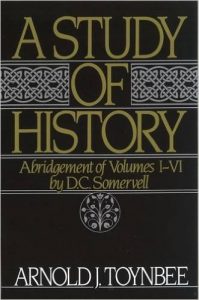 I really wanted to like this book. It’s regarded as a classic, from a time before the study of history became corrupted by political correctness. From a time when the ascendancy of a civilization was taken for granted as a good, and history was not dominated by gender and race “studies,” but focused on the reality of history and what could be objectively learned from it.
I really wanted to like this book. It’s regarded as a classic, from a time before the study of history became corrupted by political correctness. From a time when the ascendancy of a civilization was taken for granted as a good, and history was not dominated by gender and race “studies,” but focused on the reality of history and what could be objectively learned from it.
But I didn’t like the book. While undoubtedly erudite, it is extremely long-winded, and erudite to the point of turgidity. More importantly, it’s not particularly convincing in its main theses. It’s hard to condense those theses, but in essence the book (which is an abridgement of six full-length books! And there are six more not covered by this abridgment.) classifies civilizations into nineteen named ones, and purports to discern universal principles behind their rise, stagnation, and fall.
These principles include what Toynbee calls “challenge and response”—the idea that a civilization grows by meeting challenges (which can be neither too easy nor too hard). But that does not clearly distinguish cause and effect. Of course successful civilizations will continually overcome challenges. But it’s less clear that overcoming those challenges is what actually causes the civilization to become successful. Another Toynbee universal principle is that that civilizations decay not because of internal or external pressure, but because their internal “creative minority” loses will and changes from a ruling class that really leads and drives society forward, to simply an extractive ruling class in ever-greater tension with the ruled, ultimately leading to the civilization’s unravelling.
Toynbee’s most interesting universal principle is that during a time of decline, a society forms a “universal state”—not a sign of dynamism and success, but a calcification into empire with rigidity that disallows creativity and social mobility, leading to the ultimate downfall of the civilization. He did not think (as of the mid-20th Century) that the West had formed a universal state, but identified that as a future possibility.
None of this is irrational. All of it is internally coherent. It may all be true. It is quite interesting. So as a work of pure history the book is quite good, if limited in its appeal to true history buffs. But as a work of political philosophy it’s just not especially compelling, perhaps because its broad sweep makes it difficult to criticize with specificity. Similarly, a nearly total unwillingness to actually place modern Western civilization within Toynbee’s framework and make specific predictions makes it less interesting. You can understand why Toynbee didn’t want to do that, for that would have become the focus of attention on his book, but sixty years later it makes the book less appealing to modern readers.
One interesting facet of the book is that while Toynbee talks more about Western civilization and its precursors than about other civilizations, he does talk a lot about other civilizations and treats them as equally valuable and informative to his analysis (actually, as necessary to his analysis). Toynbee gives equal weight to Far Eastern (Chinese/Japanese/Korean), Indian subcontinent, and Americas civilizations in his analysis, and it appears, judging from some side comments from the abridging author, that Toynbee’s original six books went into much greater historical detail on those other civilizations, and the abridger has re-focused on the West in the interests of space. One effect, though, of choosing civilizations is that Toynbee recognizes that Africa has contributed nothing at all to world civilization, and while it has briefly had some third-order societies based on localized and transitory trade, it has never had a civilization in the Toynbee sense (though Toynbee does not rule out it creating a civilization in the future). This recognition of non-PC realities probably has contributed to the decline in Toynbee’s reputation, who was apparently once the most famous historian in the world.
So, in sum, this book is interesting for history buffs and those trying to form a coherent world historical/philosophical framework, as well as for those interested in the focuses of historians of the past. But I’m not sure it has a lot to offer the modern American, struggling with a very different America and a very different world (even if Toynbee is right that, ultimately, the world is exactly the same if viewed through the correct lens).
